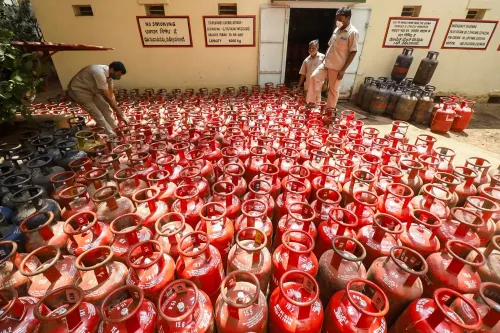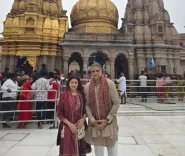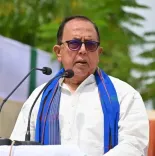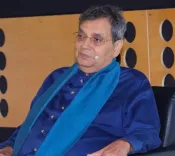Was the July 2024 Unrest in Bangladesh an 'Orchestrated Coup' Led by Yunus?
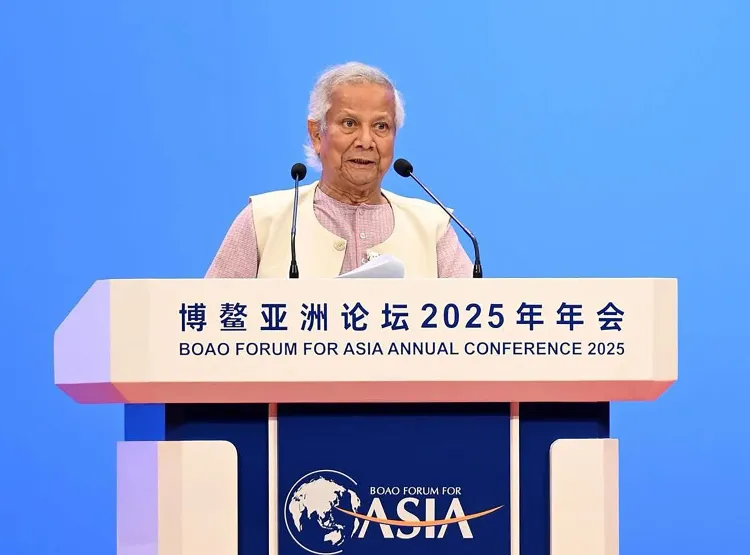
Synopsis
Key Takeaways
- Awami League accuses Yunus of orchestrating a coup.
- Protests were allegedly funded and manipulated by foreign powers.
- The collapse of democracy in Bangladesh is a key concern.
- The youth of Bangladesh are disillusioned and leaving the country.
- The narrative of a student-led movement is challenged by deeper engineering.
Dhaka, Aug 13 (NationPress) The Awami League Party of Bangladesh has claimed that the tumultuous demonstrations of July last year were not merely a spontaneous uprising, but rather a “meticulously orchestrated coup” carried out by unelected technocrats, with support from foreign powers, and spearheaded by Muhammad Yunus, who served as the Chief Advisor of the interim government.
The party noted that on the morning of August 5, 2024, Bangladesh experienced the downfall of a democratically elected government headed by former Prime Minister Sheikh Hasina, leading to a collapse of democracy, the constitution, and a significant loss of its rightful status on the global stage.
In a statement released by the Awami League on Wednesday, it was articulated, “The architects of this coup did not merely oust Sheikh Hasina — they sought to obliterate everything she and the Awami League represented. With a single stroke, the legacy of Bangabandhu was called into question, the hard-won victories of the last 15 years were discarded, and the apparatus of the state was surrendered to opportunists and ideological mercenaries.”
The statement continued, “Yunus and his circle of elite academics, NGO operatives, and foreign advisors did not arrive to restore democracy — they aimed to reshape it to fit their personal agendas. They weaponized the discontent of a generation, manipulated a grieving nation, and substituted a government elected by millions with a puppet regime conceived behind the closed doors of embassies and donor boardrooms.”
The party also pointed out that the movement from last year, which “masqueraded as a student-led protest over quotas,” exhibited signs of deeper engineering from the outset.
Awami League raised questions about how a policy disagreement could escalate overnight into a national crisis and who financed the logistics behind extensive rallies, media campaigns, and legal proceedings.
However, the party suggested that the response leads to a “nexus of NGO-backed networks, foreign embassies, and influential figures like Yunus, whose Nobel Peace Prize acted as a convenient shield” while he undermined the very peace and democracy he professed to uphold.
Criticizing Yunus for his hypocrisy, the Awami League insisted that while he presented himself as a proponent of democratic reform, he remained notably silent regarding mob assaults on elected officials, the dismantling of state institutions, and the erosion of democratic norms.
The party highlighted that Yunus' allies were emboldened by foreign endorsement, as “Western think tanks and media outlets — long critical of Hasina's independence and her refusal to align with Western hegemony — suddenly found moral justification to advocate for regime change.”
According to the Awami League, the events of 2024 represented not a collapse but a “staged demolition,” where a functioning, elected government was overthrown under the pretense of mass discontent, state media was seized, Awami League leaders were vilified or arrested, and the judiciary was weaponized rather than safeguarded, while Yunus and his foreign allies portrayed themselves as liberators.
“This was not merely a betrayal. It was a calculated demolition of a generation's future — all to fulfill the ambitions of one man and his foreign-backed circle. A nation that once took pride in its youthful demographic dividend now observes its brightest talents fleeing the country, disheartened and disenchanted,” the party asserted.
“By utilizing the youth to ascend the ladder of power, only to discard them upon reaching the top, Yunus demonstrated that his so-called revolution was never about renewal. It was about revenge, and the youth of Bangladesh bore the burden,” it concluded.



